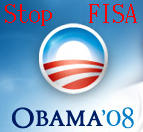
|
For once I agree with a net neutrality opponent:
By instituting this weird, weak, and barely legal regulation, Kevin Martin will get ‘net neutrality regulation bottled up in the courts for – what – the next five years?Harper goes on to predict that meanwhile real competition could develop. And pigs could fly, but that's not the point.— Game, Set, and Match: Martin! by Jim Harper, Technology Liberation Front, 6 Aug 2008
This is the point:
The paragraph prior to the provocative line suggesting regulation of universities contains this sentence: “Allowing some Internet service providers to manage P2P traffic – much less to engage in complete blocking of P2P traffic – while prohibiting others from doing so would be arbitrary and capricious.” This is an administrative-law term of art – “arbitrary and capricious.” The use of it tells us that NCTA or Comcast will challenge the FCC’s decision to regulate only one provider of Internet access without regulating all similarly situated.This is not just theoretical. Fox News recently refused to pay an FCC-imposed fine, saying it was "arbitrary and capricious". Fox cited a previous case in which a federal court slapped down the FCC for fining a show for swearing, saying it was "arbitrary and capricious".But Comcast is under a different regulatory regime!, says Harold and the others. Not in an enforcement of this “broad policy statement” thing-y. The FCC is claming free rein to regulate – not authority based firmly in statute – and if it can throw that rein over cable ISPs, it can throw that rein over universities, over Starbucks, and over the open wi-fi node in Harold’s house.
Now, given the free rein that the FCC is asserting, there is a darn good argument that it’s arbitrary (and “capricious”) to regulate only cable ISPs or commercial ISPs in this way. The FCC has to regulate the whole damn Internet this way if it’s going to regulate Comcast.
All that plus if a court rules the FCC's recent decision is "arbitrary and capricious", that will be used as a precedent to require universities to regulate content on their networks in favor of big copyright holders, as elements in Congress have been trying to do for about a year now.
I think net neutrality advocates underestimate Kevin Martin at their (and our) peril.
-jsq






